Exploring the Genetic Basis of Drought Tolerance in Alhagi camelorum: A Comprehensive Transcriptome Study of Osmotic Stress Adaptations
Abstract
1. Introduction
2. Results
2.1. PEG Treatment Inhibits A. camelorum Seedling Growth
2.2. Identification of Differentially Expressed Genes (DEGs)
2.3. Gene Ontology (GO) Enrichment Analysis in Root and Shoot Tissues Across Different PEG Concentrations
2.3.1. GO Enrichment Analysis in Root
2.3.2. GO Enrichment Analysis in Shoots
2.4. GO-Based Pathway Analysis
2.4.1. ABA Binding and Activated Signaling Pathway
2.4.2. Secondary Metabolite Pathways
2.4.3. Photosynthesis-Related Pathways
2.4.4. Cell Wall Biogenesis and Organization
2.4.5. Signaling Pathways Responsive to Multiple Hormones
2.5. Hierarchical Clustering Analysis of Transcription Factors and Genes Involved in Osmotic Stress
2.5.1. Identification of Differentially Expressed Transcription Factors (DETFs)
2.5.2. Coexpression Patterns of Transcription Factors and Genes Involved in Osmotic Stress
3. Discussion
3.1. Tissue-Specific and Concentration-Dependent Regulation of Osmotic Stress Response Pathways in A. camelorum
3.2. Multi-Hormonal Regulation of Osmotic Stress Responses in A. camelorum
3.3. Key Genes Involved in PEG-Induced Osmotic Stress Adaptation
4. Materials and Methods
4.1. Plant Material and PEG Treatments
4.2. Phenotypic Analysis
4.3. Transcriptome Analysis
4.4. Differential Gene Expression and Functional Enrichment Analysis
4.5. Identification of Key Pathways and Hierarchical Cluster Analysis
4.6. Clustered Coexpression Patterns of Transcription Factors and Drought-Responsive Genes
5. Conclusions
Supplementary Materials
Author Contributions
Funding
Institutional Review Board Statement
Informed Consent Statement
Data Availability Statement
Conflicts of Interest
References
- Muhammad, G.; Hussain, M.A.; Anwar, F.; Ashraf, M.; Gilani, A.H. Alhagi: A plant genus rich in bioactives for pharmaceuticals. Phytother. Res. 2015, 29, 1–13. [Google Scholar] [CrossRef] [PubMed]
- Tariq, A.; Ullah, A.; Sardans, J.; Zeng, F.; Graciano, C.; Li, X.; Wang, W.; Ahmed, Z.; Ali, S.; Zhang, Z. Alhagi sparsifolia: An ideal phreatophyte for combating desertification and land degradation. Sci. Total Environ. 2022, 844, 157228. [Google Scholar] [CrossRef] [PubMed]
- Asghari, M.H.; Fallah, M.; Moloudizargari, M.; Mehdikhani, F.; Sepehrnia, P.; Moradi, B. A systematic and mechanistic review on the phytopharmacological properties of Alhagi species. Anc. Sci. Life 2016, 36, 65–71. [Google Scholar]
- Pirasteh-Anosheh, H.; Parvizi, H.; Parnian, A.; Esfahan, E.Z.; Ranjbar, G.; Bhardwaj, A.K. Relationship between soil salinity and alkalinity with Alhagi camelorum growth in hypersaline and hyperarid environments. J. Arid Environ. 2022, 206, 104830. [Google Scholar] [CrossRef]
- Ullah, A.; Tariq, A.; Sardans, J.; Peñuelas, J.; Zeng, F.; Graciano, C.; Asghar, M.A.; Raza, A.; Xiong, Y.-C.; Chai, X. Alhagi sparsifolia acclimatizes to saline stress by regulating its osmotic, antioxidant, and nitrogen assimilation potential. BMC Plant Biol. 2022, 22, 453. [Google Scholar] [CrossRef]
- Wei, F.; Yang, X.; Pang, K.; Tang, H. Traditional uses, chemistry, pharmacology, toxicology and quality control of Alhagi sparsifolia Shap.: A review. Front. Pharmacol. 2021, 12, 761811. [Google Scholar] [CrossRef]
- Verma, G.; Kumar, S.; Singh, A. A brief review on pharmacognostic and pharmacological study of Alhagi camelorum. Int. J. Pharm. Res. 2021, 13, 3194. [Google Scholar]
- Xu, M.; Gao, Y.; Zhang, Z.; Huang, C.; Zeng, F. Effects of drought stress on growth and physiology of Alhagi sparsifolia seedlings. Arid Zone Res. 2023, 40, 257–267. [Google Scholar]
- Ullah, A.; Tariq, A.; Zeng, F.; Asghar, M.A.; Sardans, J.; Graciano, C.; Ali, I.; Peñuelas, J. Drought priming improves tolerance of Alhagi sparsifolia to subsequent drought: A coordinated interplay of phytohormones, osmolytes, and antioxidant potential. Plant Stress 2024, 12, 100469. [Google Scholar] [CrossRef]
- Hussain, S.; Shaukat, M.; Ashraf, M.; Zhu, C.; Jin, Q.; Zhang, J. Salinity stress in arid and semi-arid climates: Effects and management in field crops. Clim. Chang. Agric. 2019, 13, 201–226. [Google Scholar]
- Yu, B.; Chao, D.Y.; Zhao, Y. How plants sense and respond to osmotic stress. J. Integr. Plant Biol. 2024, 66, 394–423. [Google Scholar] [CrossRef] [PubMed]
- Lei, C.; Bagavathiannan, M.; Wang, H.; Sharpe, S.M.; Meng, W.; Yu, J. Osmopriming with polyethylene glycol (PEG) for abiotic stress tolerance in germinating crop seeds: A review. Agronomy 2021, 11, 2194. [Google Scholar] [CrossRef]
- Lawlor, D. Absorption of polyethylene glycols by plants and their effects on plant growth. New Phytol. 1970, 69, 501–513. [Google Scholar] [CrossRef]
- Jamshidi Goharrizi, K.; Moosavi, S.S.; Amirmahani, F.; Salehi, F.; Nazari, M. Assessment of changes in growth traits, oxidative stress parameters, and enzymatic and non-enzymatic antioxidant defense mechanisms in Lepidium draba plant under osmotic stress induced by polyethylene glycol. Protoplasma 2020, 257, 459–473. [Google Scholar] [CrossRef] [PubMed]
- Soboleva, A.; Frolova, N.; Bureiko, K.; Shumilina, J.; Balcke, G.U.; Zhukov, V.A.; Tikhonovich, I.A.; Frolov, A. Dynamics of reactive carbonyl species in pea root nodules in response to polyethylene glycol (PEG)-induced osmotic stress. Int. J. Mol. Sci. 2022, 23, 2726. [Google Scholar] [CrossRef]
- Hossain, M.S.; Li, J.; Wang, C.; Monshi, F.I.; Tabassum, R.; Islam, M.A.; Faruquee, M.; Muktadir, M.A.; Mia, M.S.; Islam, A.M. Enhanced antioxidant activity and secondary metabolite production in Tartary buckwheat under polyethylene glycol (PEG)-induced drought stress during germination. Agronomy 2024, 14, 619. [Google Scholar] [CrossRef]
- Jaybhaye, S.G.; Deshmukh, A.S.; Chavhan, R.L.; Patade, V.Y.; Hinge, V.R. GA3 and BAP phytohormone seed priming enhances germination and PEG induced drought stress tolerance in soybean by triggering the expression of osmolytes, antioxidant enzymes and related genes at the early seedling growth stages. Environ. Exp. Bot. 2024, 226, 105870. [Google Scholar] [CrossRef]
- Li, J.; Yao, S.; Kim, S.-C.; Wang, X. Lipid phosphorylation by a diacylglycerol kinase suppresses ABA biosynthesis to regulate plant stress responses. Mol. Plant 2024, 17, 342–358. [Google Scholar] [CrossRef]
- Pardo-Hernández, M.; Arbona, V.; Simon, I.; Rivero, R.M. Specific ABA-independent tomato transcriptome reprogramming under abiotic stress combination. Plant J. 2024, 117, 1746–1763. [Google Scholar] [CrossRef]
- Qi, Y.; Ma, L.; Ghani, M.I.; Peng, Q.; Fan, R.; Hu, X.; Chen, X. Effects of drought stress induced by hypertonic polyethylene glycol (PEG-6000) on Passiflora edulis sims physiological properties. Plants 2023, 12, 2296. [Google Scholar] [CrossRef]
- Li, S.; Wang, X.; Liu, X.; Thompson, A.J.; Liu, F. Elevated CO2 and high endogenous ABA level alleviate PEG-induced short-term osmotic stress in tomato plants. Environ. Exp. Bot. 2022, 194, 104763. [Google Scholar] [CrossRef]
- Luo, X.; Li, C.; He, X.; Zhang, X.; Zhu, L. ABA signaling is negatively regulated by GbWRKY1 through JAZ1 and ABI1 to affect salt and drought tolerance. Plant Cell Rep. 2020, 39, 181–194. [Google Scholar] [CrossRef] [PubMed]
- Zareen, S.; Ali, A.; Yun, D.-J. Significance of ABA biosynthesis in plant adaptation to drought stress. J. Plant Biol. 2024, 67, 175–184. [Google Scholar] [CrossRef]
- Fujita, K.; Inui, H. Review: Biological functions of major latex-like proteins in plants. Plant Sci. 2021, 306, 110856. [Google Scholar] [CrossRef] [PubMed]
- Wang, Y.; Yang, L.; Chen, X.; Ye, T.; Zhong, B.; Liu, R.; Wu, Y.; Chan, Z. Major latex protein-like protein 43 (MLP43) functions as a positive regulator during abscisic acid responses and confers drought tolerance in Arabidopsis thaliana. J. Exp. Bot. 2016, 67, 421–434. [Google Scholar] [CrossRef]
- Shen, N.; Chen, S.; Wang, X.; Cheng, Y.; Gao, H.; Chen, X. Plant flavonoids: Classification, distribution, biosynthesis, and antioxidant activity. Food Chem. 2022, 383, 132531. [Google Scholar] [CrossRef]
- Ahmad, S.; Belwal, V.; Punia, S.S.; Ram, M.; Dalip; Rajput, S.S.; Kunwar, R.; Meena, M.K.; Gupta, D.; Kumawat, G.L. Role of plant secondary metabolites and phytohormones in drought tolerance: A review. Gesunde Pflanz. 2023, 75, 729–746. [Google Scholar] [CrossRef]
- Cirillo, V.; D’Amelia, V.; Esposito, M.; Amitrano, C.; Carillo, P.; Carputo, D.; Maggio, A. Anthocyanins are key regulators of drought stress tolerance in tobacco. Biology 2021, 10, 139. [Google Scholar] [CrossRef]
- Ma, D.; Sun, D.; Wang, C.; Li, Y.; Guo, T. Expression of flavonoid biosynthesis genes and accumulation of flavonoid in wheat leaves in response to drought stress. Plant Physiol. Biochem. 2014, 80, 60–66. [Google Scholar] [CrossRef]
- Li, B.; Fan, R.; Sun, G.; Sun, T.; Fan, Y.; Bai, S.; Guo, S.; Huang, S.; Liu, J.; Zhang, H. Flavonoids improve drought tolerance of maize seedlings by regulating the homeostasis of reactive oxygen species. Plant Soil 2021, 461, 389–405. [Google Scholar] [CrossRef]
- Li, P.; Li, Y.J.; Zhang, F.J.; Zhang, G.Z.; Jiang, X.Y.; Yu, H.M.; Hou, B.K. The Arabidopsis UDP-glycosyltransferases UGT79B2 and UGT79B3, contribute to cold, salt and drought stress tolerance via modulating anthocyanin accumulation. Plant J. Cell Mol. Biol. 2017, 89, 85–103. [Google Scholar] [CrossRef] [PubMed]
- Munné-Bosch, S.; Mueller, M.; Schwarz, K.; Alegre, L. Diterpenes and antioxidative protection in drought-stressed Salvia officinalis plants. J. Plant Physiol. 2001, 158, 1431–1437. [Google Scholar] [CrossRef]
- Yang, X.; Han, Y.; Hao, J.; Qin, X.; Liu, C.; Fan, S. Exogenous spermidine enhances the photosynthesis and ultrastructure of lettuce seedlings under high-temperature stress. Sci. Hortic. 2022, 291, 110570. [Google Scholar] [CrossRef]
- Mafakheri, A.; Siosemardeh, A.; Bahramnejad, B.; Struik, P.; Sohrabi, Y. Effect of drought stress on yield, proline and chlorophyll contents in three chickpea cultivars. Aust. J. Crop Sci. 2010, 4, 580–585. [Google Scholar]
- Pandey, J.; Devadasu, E.; Saini, D.; Dhokne, K.; Marriboina, S.; Raghavendra, A.S.; Subramanyam, R. Reversible changes in structure and function of photosynthetic apparatus of pea (Pisum sativum) leaves under drought stress. Plant J. 2023, 113, 60–74. [Google Scholar] [CrossRef] [PubMed]
- Zahra, N.; Hafeez, M.B.; Kausar, A.; Al Zeidi, M.; Asekova, S.; Siddique, K.H.M.; Farooq, M. Plant photosynthetic responses under drought stress: Effects and management. J. Agron. Crops Sci. 2023, 209, 651–672. [Google Scholar] [CrossRef]
- Ganie, S.A.; Ahammed, G.J. Dynamics of cell wall structure and related genomic resources for drought tolerance in rice. Plant Cell Rep. 2021, 40, 437–459. [Google Scholar] [CrossRef]
- Yao, K.; Yao, Y.; Ding, Z.; Pan, X.; Zheng, Y.; Huang, Y.; Zhang, Z.; Li, A.; Wang, C.; Li, C.; et al. Characterization of the FLA gene family in tomato (Solanum lycopersicum L.) and the expression analysis of SlFLAs in response to hormone and abiotic stresses. Int. J. Mol. Sci. 2023, 24, 16063. [Google Scholar] [CrossRef]
- Tenhaken, R. Cell wall remodeling under abiotic stress. Front. Plant Sci. 2015, 5, 771. [Google Scholar] [CrossRef]
- Hu, W.; Gao, M.; Xu, B.; Wang, S.; Wang, Y.; Zhou, Z. Co-occurring elevated temperature and drought stresses during cotton fiber thickening stage inhibit fiber biomass accumulation and cellulose synthesis. Ind. Crops Prod. 2022, 187, 115348. [Google Scholar] [CrossRef]
- Müller, M.; Munné-Bosch, S. Ethylene response factors: A key regulatory hub in hormone and stress signaling. Plant Physiol. 2015, 169, 32–41. [Google Scholar] [CrossRef] [PubMed]
- An, J.-P.; Zhang, X.-W.; Bi, S.-Q.; You, C.-X.; Wang, X.-F.; Hao, Y.-J. The ERF transcription factor MdERF38 promotes drought stress-induced anthocyanin biosynthesis in apple. Plant J. 2020, 101, 573–589. [Google Scholar] [CrossRef] [PubMed]
- Khoso, M.A.; Hussain, A.; Ritonga, F.N.; Ali, Q.; Channa, M.M.; Alshegaihi, R.M.; Meng, Q.; Ali, M.; Zaman, W.; Brohi, R.D.; et al. WRKY transcription factors (TFs): Molecular switches to regulate drought, temperature, and salinity stresses in plants. Front. Plant Sci. 2022, 13, 1039329. [Google Scholar] [CrossRef] [PubMed]
- Feng, H.; Lu, Y.; Ren, B.; Yang, S.; Liu, Y.; Lu, L.; Li, L. Identification and Expression Analysis of the BTB/POZ Gene Family in Solanum tuberosum. Horticulturae 2024, 10, 543. [Google Scholar] [CrossRef]
- Zhou, Y.; Zhai, H.; He, S.; Zhu, H.; Gao, S.; Xing, S.; Wei, Z.; Zhao, N.; Liu, Q. The sweetpotato BTB-TAZ protein gene, IbBT4, enhances drought tolerance in transgenic Arabidopsis. Front. Plant Sci. 2020, 11, 877. [Google Scholar] [CrossRef]
- Jaiswal, V.; Kakkar, M.; Kumari, P.; Zinta, G.; Gahlaut, V.; Kumar, S. Multifaceted roles of GRAS transcription factors in growth and stress responses in plants. iScience 2022, 25, 105026. [Google Scholar] [CrossRef]
- Oh, D.; Lim, C.W.; Lee, S.C. GRAS-type transcription factor CaGRAS1 functions as a positive regulator of the drought response in Capsicum annuum. Environ. Exp. Bot. 2022, 198, 104853. [Google Scholar] [CrossRef]
- Zhang, X.; Gong, X.; Yu, H.; Su, X.; Cheng, S.; Huang, J.; Lei, Z.; Li, M.; Ma, F. The proline-rich protein MdPRP6 confers tolerance to salt stress in transgenic apple (Malus domestica). Sci. Hortic. 2023, 308, 111581. [Google Scholar] [CrossRef]
- Rajasheker, G.; Nagaraju, M.; Varghese, R.P.; Jalaja, N.; Somanaboina, A.K.; Singam, P.; Ramakrishna, C.; Penna, S.; Sreenivasulu, N.; Kishor, P.B.K. Identification and analysis of proline-rich proteins and hybrid proline-rich proteins super family genes from Sorghum bicolor and their expression patterns to abiotic stress and zinc stimuli. Front. Plant Sci. 2022, 13, 952732. [Google Scholar] [CrossRef]
- Gujjar, R.; Pathak, A.D.; Karkute, S.; Supaibulwattana, K. Multifunctional proline rich proteins and their role in regulating cellular proline content in plants under stress. Biol. Plant. 2019, 63, 448–454. [Google Scholar] [CrossRef]
- Li, Y.; Chen, X.; Chen, Z.; Cai, R.; Zhang, H.; Xiang, Y. Identification and expression analysis of BURP domain-containing genes in Medicago truncatula. Front. Plant Sci. 2016, 7, 485. [Google Scholar] [CrossRef] [PubMed]
- Kavas, M.; Yıldırım, K.; Seçgin, Z.; Abdulla, M.F.; Gökdemir, G. Genome-wide identification of the BURP domain-containing genes in Phaseolus vulgaris. Physiol. Mol. Biol. Plants 2021, 27, 1885–1902. [Google Scholar] [CrossRef] [PubMed]
- Xiao, Y.; Xiao, C.; He, X.; Yang, X.; Tong, Z.; Wang, Z.; Sun, Z.; Qiu, W. A novel non-specific lipid transfer protein gene, CmnsLTP6.9, enhanced osmotic and drought tolerance by regulating ros scavenging and remodeling lipid profiles in Chinese chestnut (Castanea mollissima Blume). Plants 2023, 12, 3916. [Google Scholar] [CrossRef] [PubMed]
- Hong, M.; Kim, D.Y.; Lee, T.G.; Jeon, W.; Seo, Y. Functional characterization of pectin methylesterase inhibitor (PMEI) in wheat. Genes Genet. Syst. 2010, 85, 97–106. [Google Scholar] [CrossRef] [PubMed]
- Liu, J.-X.; Bennett, J. Reversible and irreversible drought-induced changes in the anther proteome of rice (Oryza sativa L.) genotypes IR64 and moroberekan. Mol. Plant 2011, 4, 59–69. [Google Scholar] [CrossRef]
- Chowdhury, R.H.; Eti, F.S.; Ahmed, R.; Gupta, S.D.; Jhan, P.K.; Islam, T.; Bhuiyan, M.A.R.; Rubel, M.H.; Khayer, A. Drought-responsive genes in tomato: Meta-analysis of gene expression using machine learning. Sci. Rep. 2023, 13, 19374. [Google Scholar] [CrossRef]
- Wu, X.; Lai, Y.; Lv, L.; Ji, M.; Han, K.; Yan, D.; Lu, Y.; Peng, J.; Rao, S.; Yan, F.; et al. Fasciclin-like arabinogalactan gene family in Nicotiana benthamiana: Genome-wide identification, classification and expression in response to pathogens. BMC Plant Biol. 2020, 20, 305. [Google Scholar] [CrossRef]
- Yan, Y.; Li, M.; Zhang, X.; Kong, W.; Bendahmane, M.; Bao, M.; Fu, X. Tissue-Specific Expression of the Terpene Synthase Family Genes in Rosa chinensis and Effect of Abiotic Stress Conditions. Genes 2022, 13, 547. [Google Scholar] [CrossRef]
- Kreuzwieser, J.; Meischner, M.; Grün, M.; Yáñez-Serrano, A.M.; Fasbender, L.; Werner, C. Drought affects carbon partitioning into volatile organic compound biosynthesis in Scots pine needles. New Phytol. 2021, 232, 1930–1943. [Google Scholar] [CrossRef]
- Zhang, Y.; Diao, S.; Ding, X.; Sun, J.; Luan, Q.; Jiang, J. Transcriptional regulation modulates terpenoid biosynthesis of Pinus elliottii under drought stress. Ind. Crops Prod. 2023, 202, 116975. [Google Scholar] [CrossRef]
- Nakabayashi, R.; Yonekura-Sakakibara, K.; Urano, K.; Suzuki, M.; Yamada, Y.; Nishizawa, T.; Matsuda, F.; Kojima, M.; Sakakibara, H.; Shinozaki, K.; et al. Enhancement of oxidative and drought tolerance in Arabidopsis by overaccumulation of antioxidant flavonoids. Plant J. 2014, 77, 367–379. [Google Scholar] [CrossRef] [PubMed]
- Li, B.; Fan, R.; Fan, Y.; Liu, R.; Zhang, H.; Chen, T.; Liu, J.; Li, H.; Zhao, X.; Song, C.-P. The flavonoid biosynthesis regulator PFG3 confers drought stress tolerance in plants by promoting flavonoid accumulation. Environ. Exp. Bot. 2022, 196, 104792. [Google Scholar]
- Li, X.; Zhong, M.; Qu, L.; Yang, J.; Liu, X.; Zhao, Q.; Liu, X.; Zhao, X. AtMYB32 regulates the ABA response by targeting ABI3, ABI4 and ABI5 and the drought response by targeting CBF4 in Arabidopsis. Plant Sci. 2021, 310, 110983. [Google Scholar] [CrossRef] [PubMed]
- Romero-Romero, J.L.; Inostroza-Blancheteau, C.; Orellana, D.; Aquea, F.; Reyes-Díaz, M.; Gil, P.M.; Matte, J.P.; Arce-Johnson, P. Stomata regulation by tissue-specific expression of the Citrus sinensis MYB61 transcription factor improves water-use efficiency in Arabidopsis. Plant Physiol. Biochem. 2018, 130, 54–60. [Google Scholar] [CrossRef]
- Ma, Z.; Hu, L.; Jiang, W. Understanding AP2/ERF transcription factor responses and tolerance to various abiotic stresses in plants: A comprehensive review. Int. J. Mol. Sci. 2024, 25, 893. [Google Scholar] [CrossRef]
- Li, P.; Zhang, B.; Su, T.; Li, P.; Xin, X.; Wang, W.; Zhao, X.; Yu, Y.; Zhang, D.; Yu, S.; et al. BrLAS, a GRAS transcription factor from Brassica rapa, is involved in drought stress tolerance in transgenic Arabidopsis. Front. Plant Sci. 2018, 9, 1792. [Google Scholar] [CrossRef]
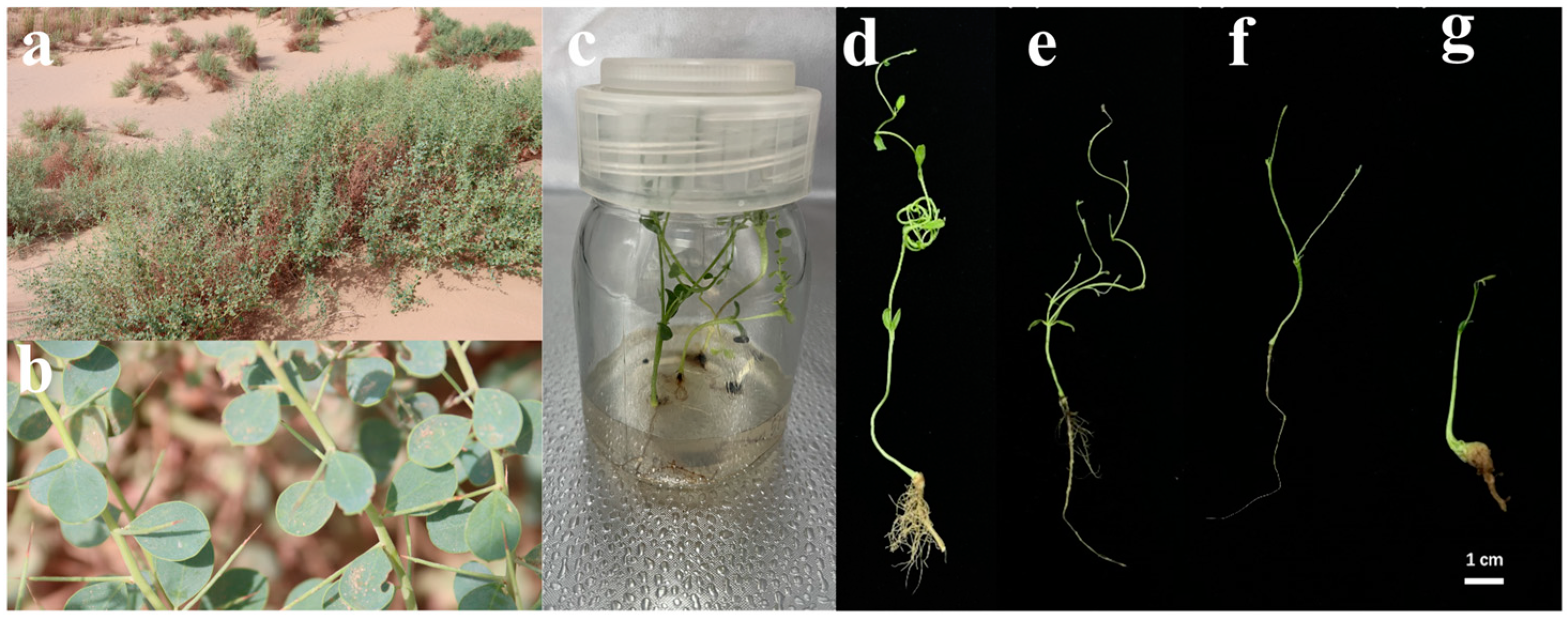
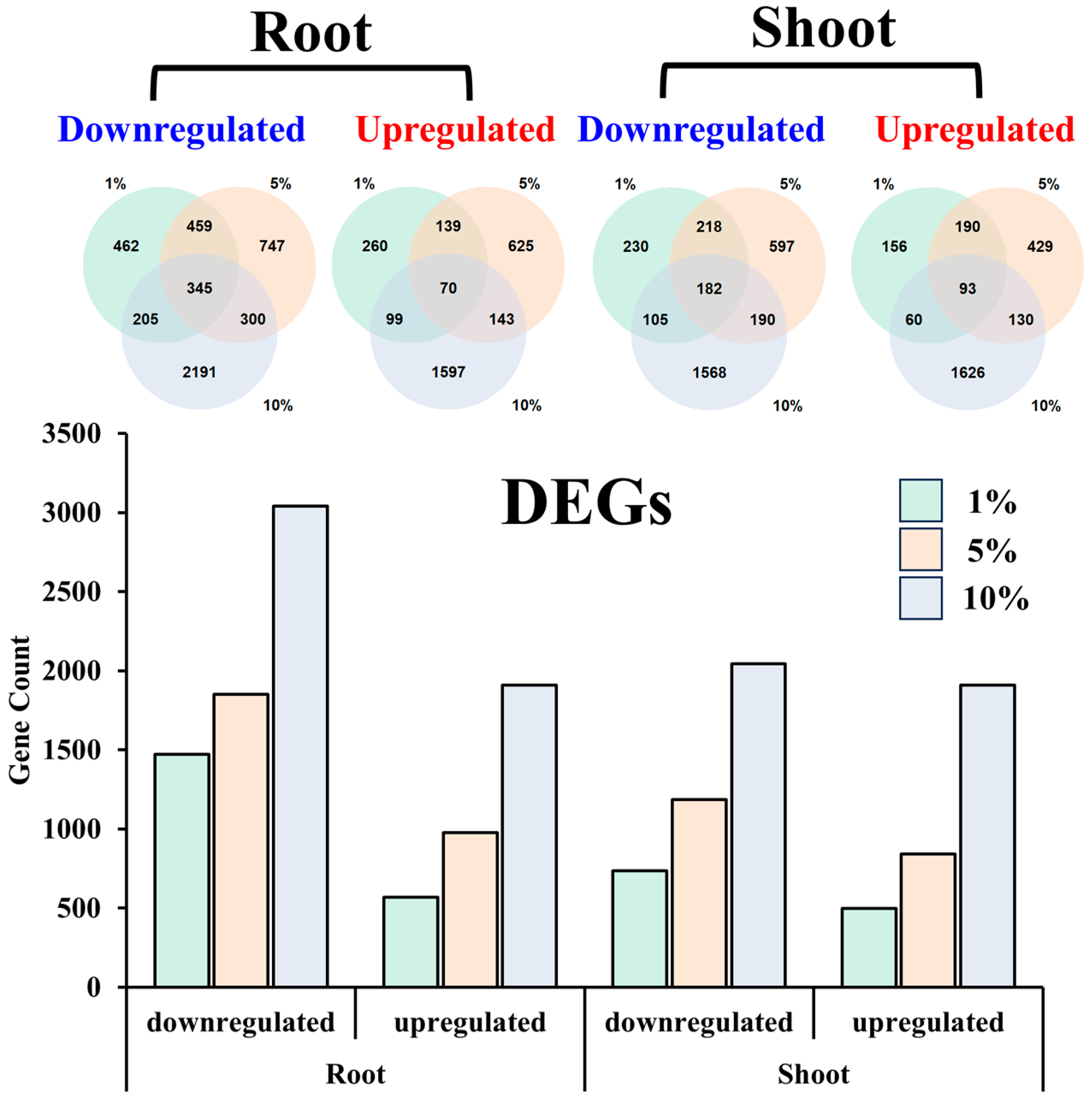

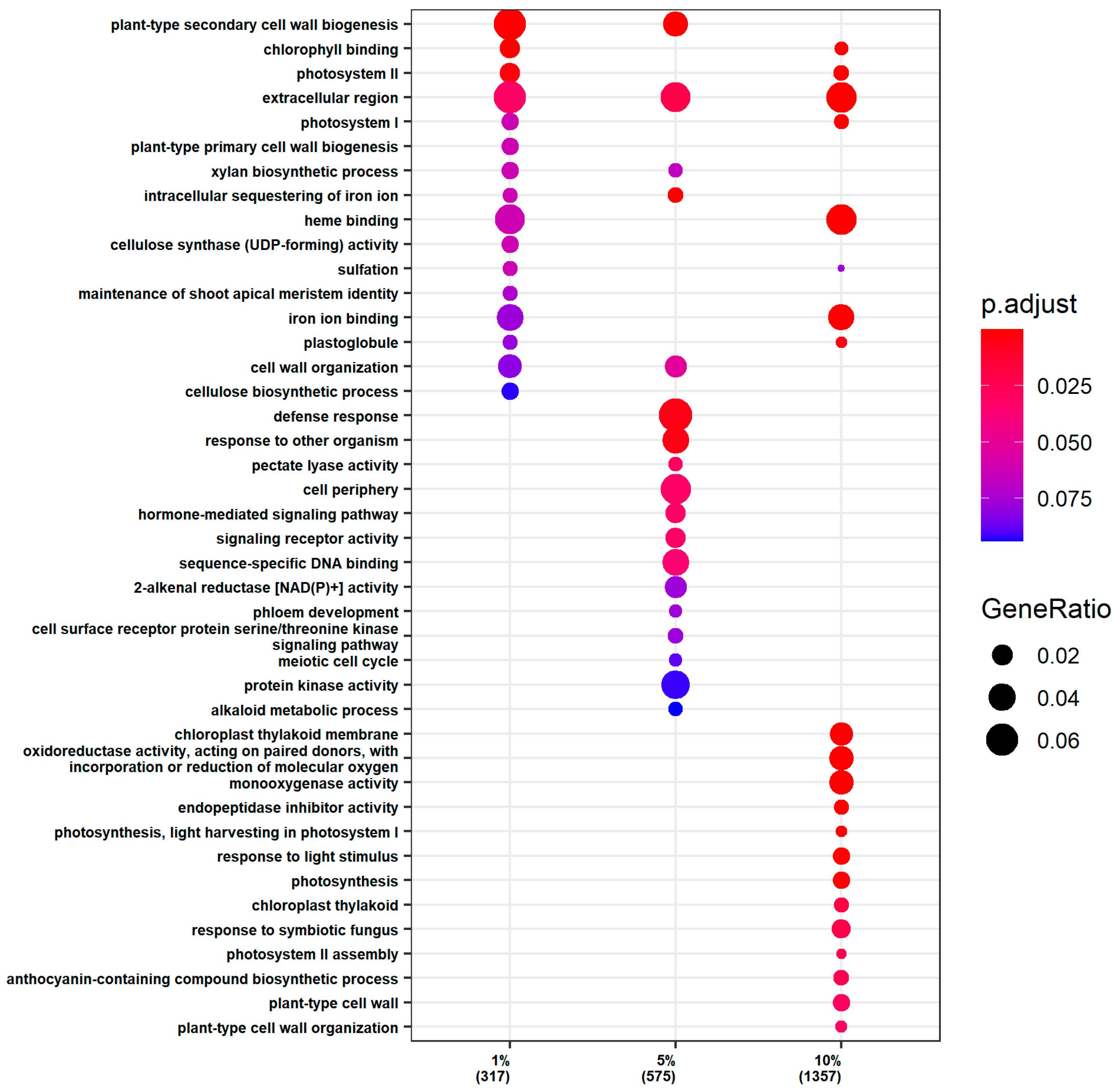
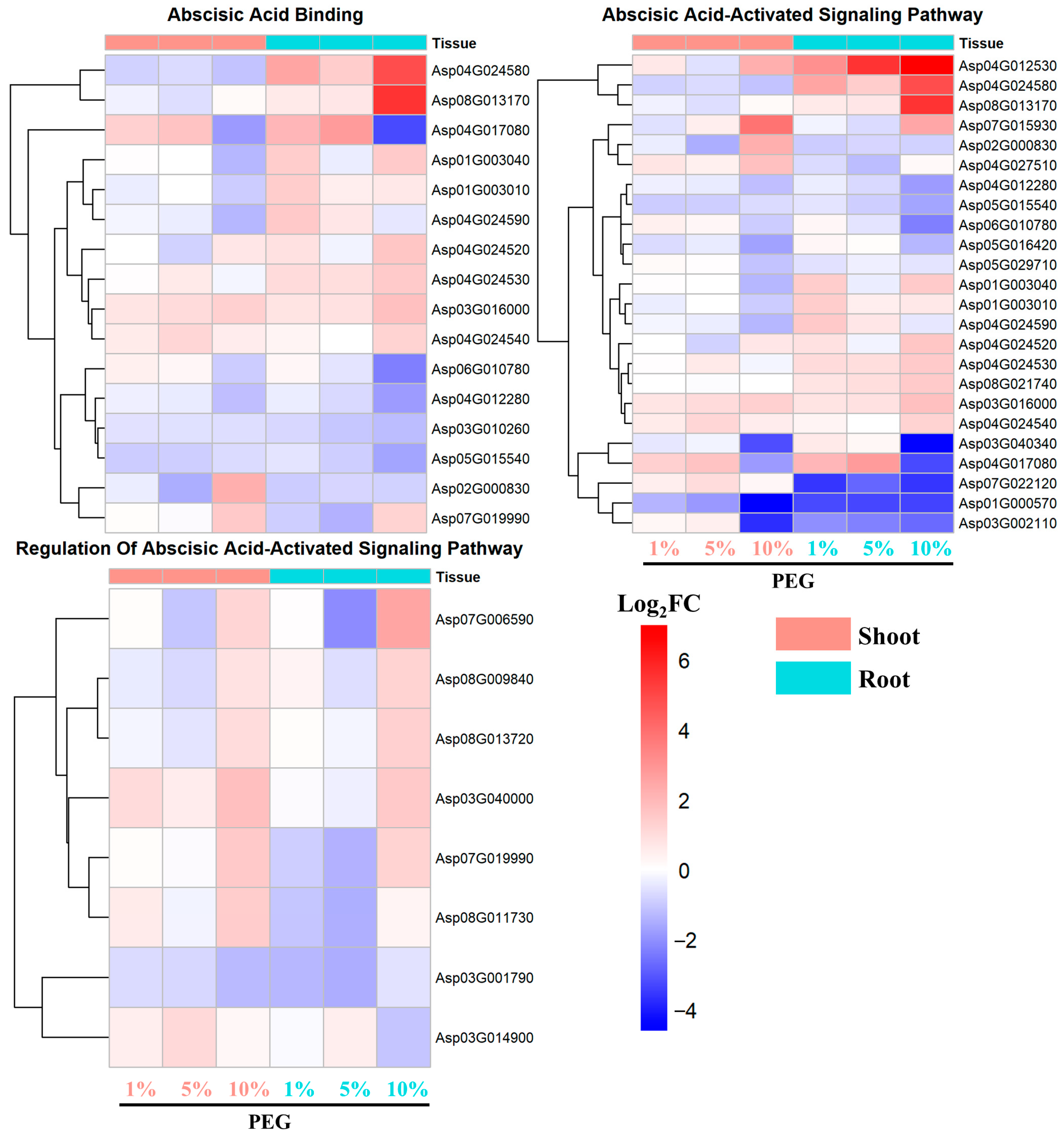
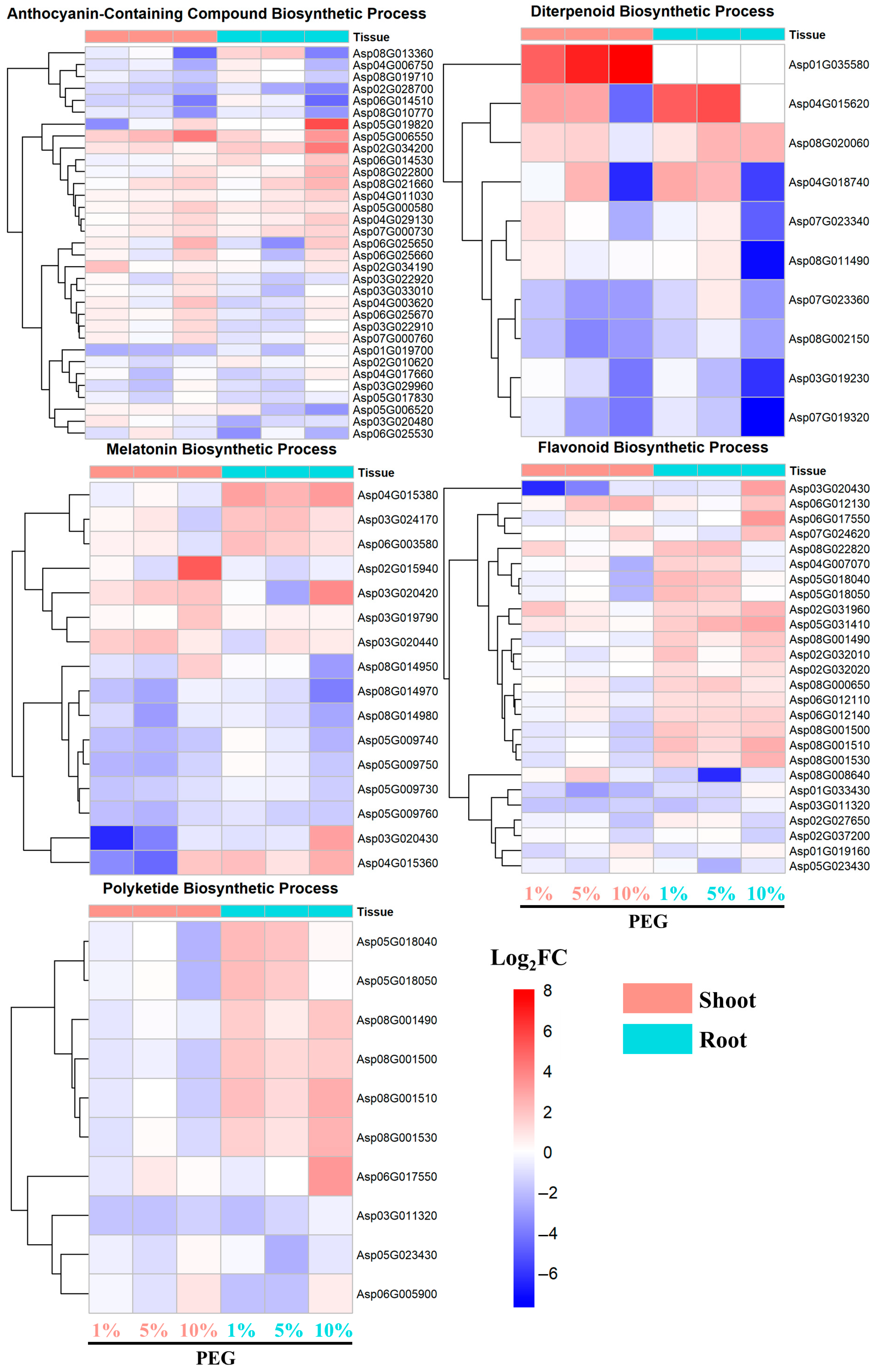
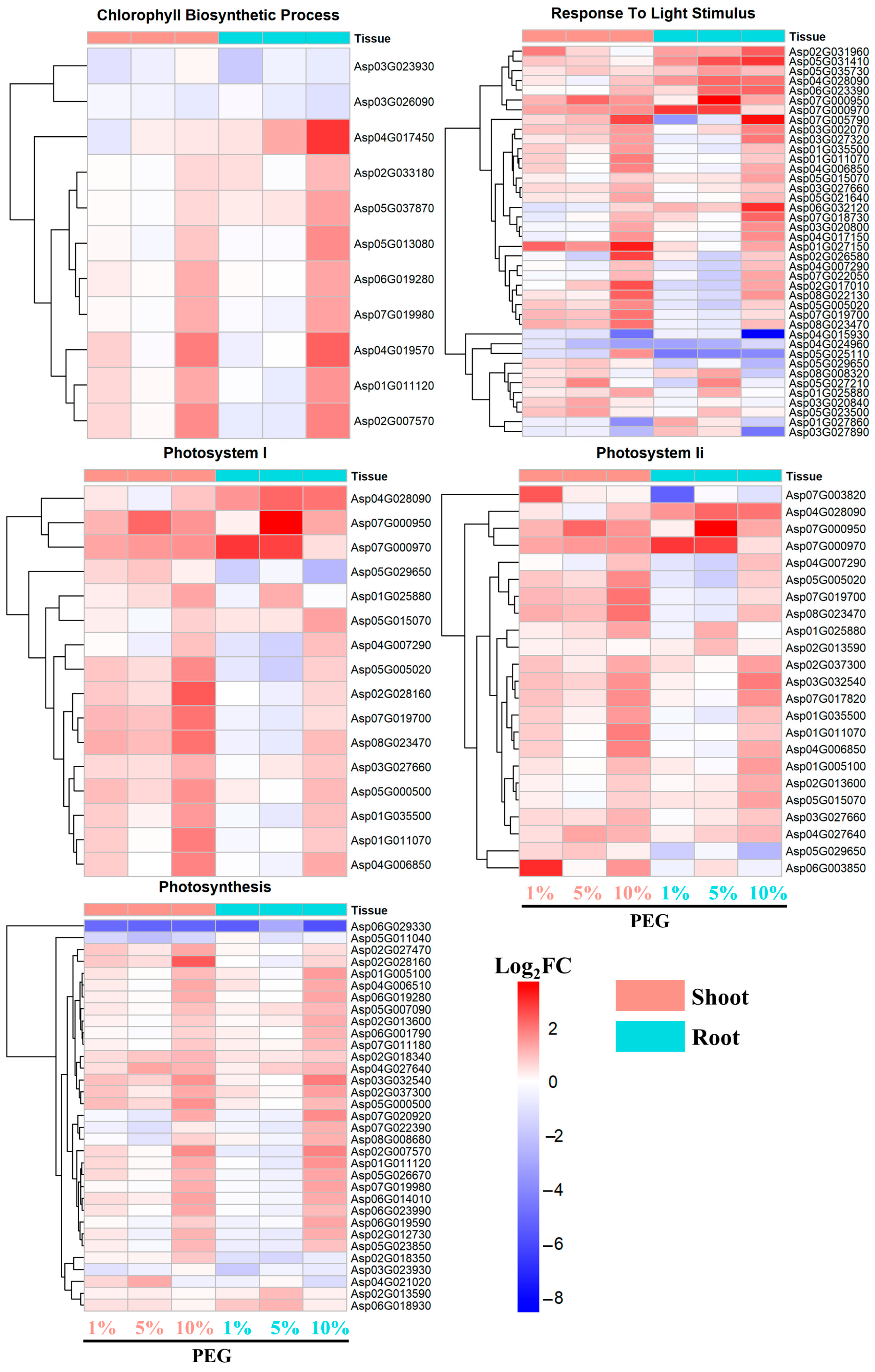
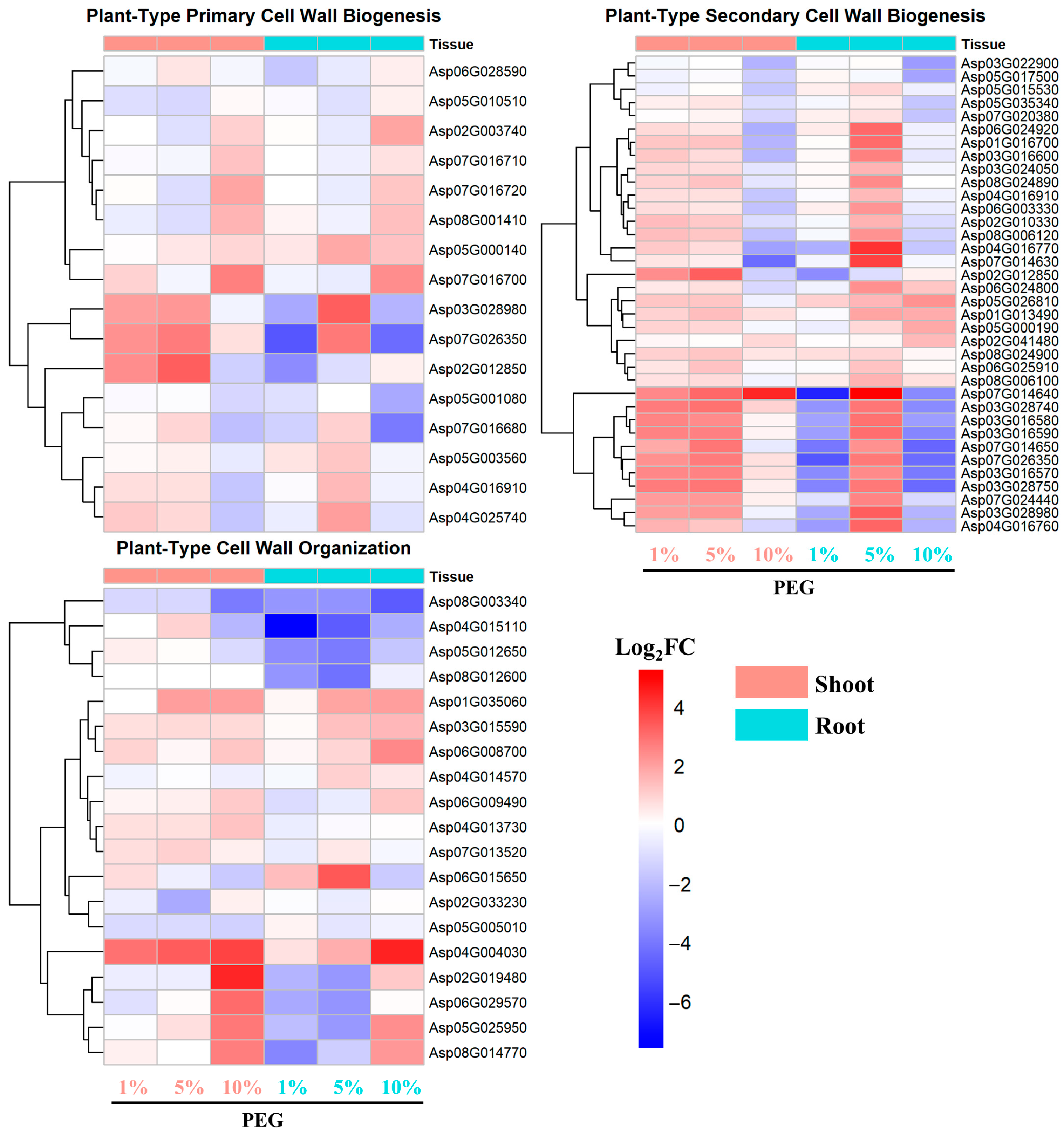
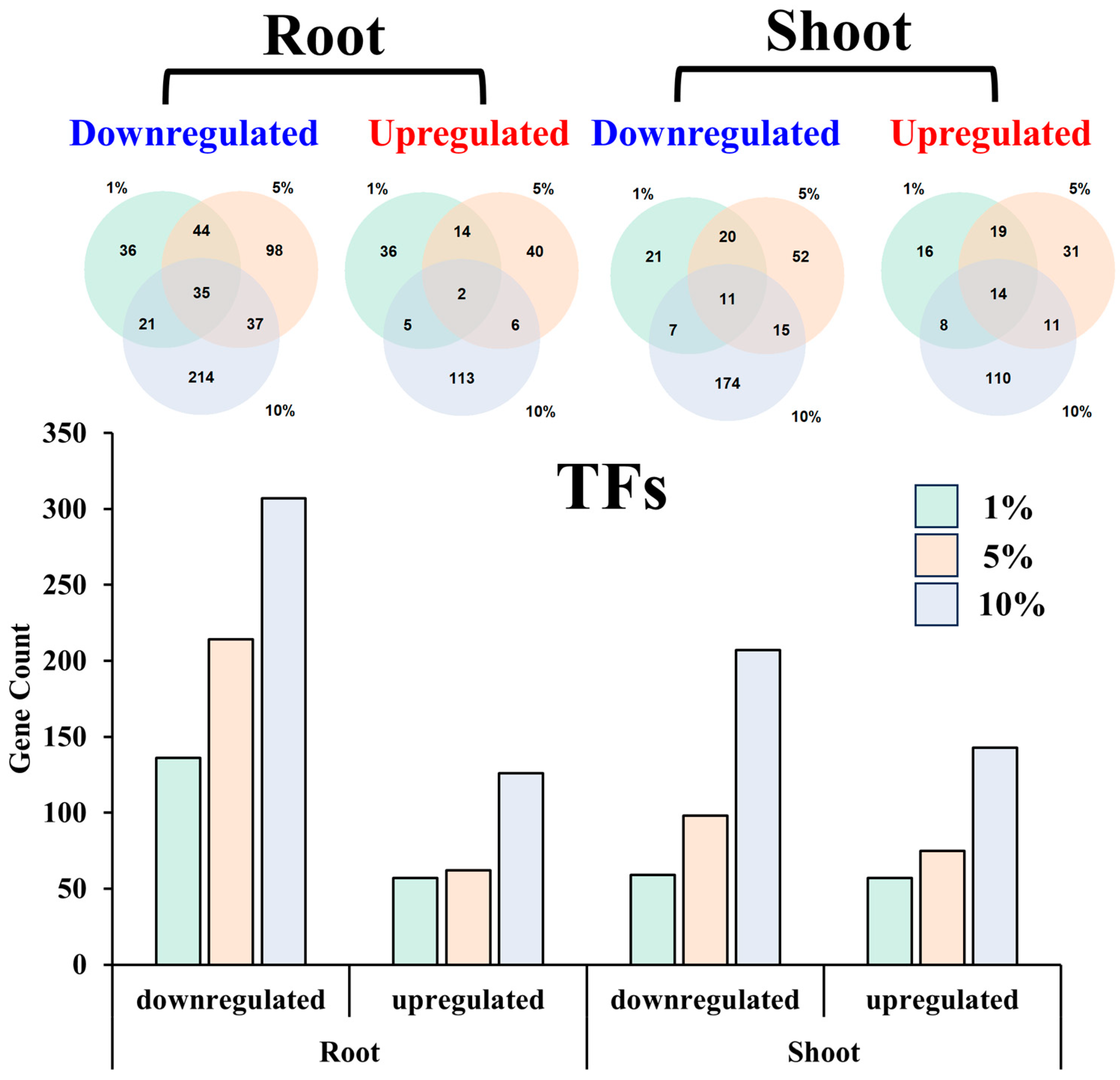
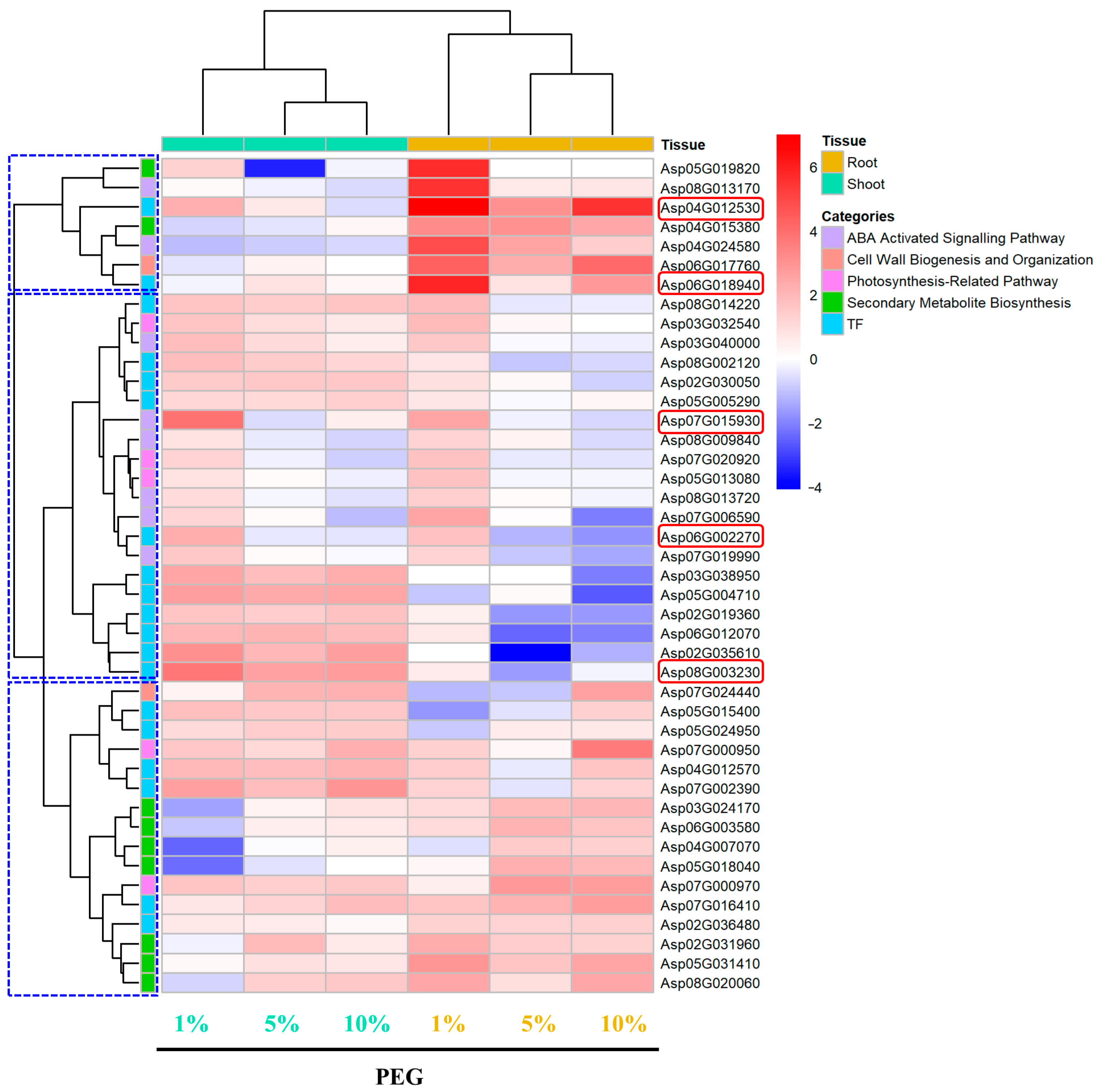
Disclaimer/Publisher’s Note: The statements, opinions and data contained in all publications are solely those of the individual author(s) and contributor(s) and not of MDPI and/or the editor(s). MDPI and/or the editor(s) disclaim responsibility for any injury to people or property resulting from any ideas, methods, instructions or products referred to in the content. |
© 2024 by the authors. Licensee MDPI, Basel, Switzerland. This article is an open access article distributed under the terms and conditions of the Creative Commons Attribution (CC BY) license (https://creativecommons.org/licenses/by/4.0/).
Share and Cite
Tang, G.; Li, X.; Zeng, F.; Ma, J.; Guan, P.; Zhang, B. Exploring the Genetic Basis of Drought Tolerance in Alhagi camelorum: A Comprehensive Transcriptome Study of Osmotic Stress Adaptations. Int. J. Mol. Sci. 2024, 25, 12725. https://doi.org/10.3390/ijms252312725
Tang G, Li X, Zeng F, Ma J, Guan P, Zhang B. Exploring the Genetic Basis of Drought Tolerance in Alhagi camelorum: A Comprehensive Transcriptome Study of Osmotic Stress Adaptations. International Journal of Molecular Sciences. 2024; 25(23):12725. https://doi.org/10.3390/ijms252312725
Chicago/Turabian StyleTang, Gangliang, Xiangyi Li, Fanjiang Zeng, Junning Ma, Pingyin Guan, and Bo Zhang. 2024. "Exploring the Genetic Basis of Drought Tolerance in Alhagi camelorum: A Comprehensive Transcriptome Study of Osmotic Stress Adaptations" International Journal of Molecular Sciences 25, no. 23: 12725. https://doi.org/10.3390/ijms252312725
APA StyleTang, G., Li, X., Zeng, F., Ma, J., Guan, P., & Zhang, B. (2024). Exploring the Genetic Basis of Drought Tolerance in Alhagi camelorum: A Comprehensive Transcriptome Study of Osmotic Stress Adaptations. International Journal of Molecular Sciences, 25(23), 12725. https://doi.org/10.3390/ijms252312725







